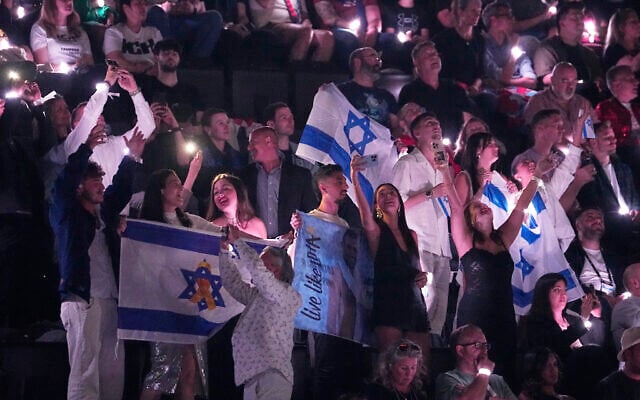Eurovision Song Contest organizers will no longer meet online in November to vote on Israel’s participation in the competition, following Middle East “developments,” the European Broadcasting Union said Monday in an apparent reference to the Gaza ceasefire.
Austria had appealed to countries not to boycott next year’s contest — due to be held in Vienna — over Israel’s participation and concerns about its conduct in the Gaza war, which was sparked by the Hamas onslaught of October 7, 2023.
Eurovision, which stresses its political neutrality, has faced controversy this year linked to the war, and several countries had pledged to withdraw from the event if Israel took part.
Austrian national broadcaster, ORF, which will host the 2026 contest, told Reuters it welcomed the EBU’s decision.
On Monday, Hamas freed the last living Israeli hostages from Gaza and Israel sent home busloads of Palestinian security prisoners, including hundreds of terrorists serving life terms for murder, under a ceasefire deal aimed at bringing an end to the two-year-old war.
“The Board agreed to put the issue on the agenda of its ordinary Winter General Assembly, which will be taking place in December,” instead of the extraordinary meeting, which had been slated to take place online in November, an EBU statement said.

Israeli fans cheer for Yuval Raphael as she performs ‘New Day Will Rise’ during the second semifinal of the 69th Eurovision Song Contest, in Basel, Switzerland, May 15, 2025. (AP/Martin Meissner)
It said that following “recent developments in the Middle East” the Executive Board agreed on Monday that there should be an in-person discussion among Members “on the issue of participation in the Eurovision Song Contest 2026.”
The EBU did not clarify, when asked by Reuters, if a vote on the participation of Israel’s public broadcaster Kan would still go ahead, and said further details about the session will be shared with EBU Members in the coming weeks.
Kan did not immediately reply to a request for comment.
In September, a letter from the EBU’s president said the executive board recognized that it could not reach a consensual position on Kan’s participation in the competition.
“Given that the Union has never faced a divisive situation like this before, the Board agreed that this question merited a broader democratic basis for a decision,” Delphine Ernotte Cunci said in the letter.
Times of Israel staff contributed to this report.


